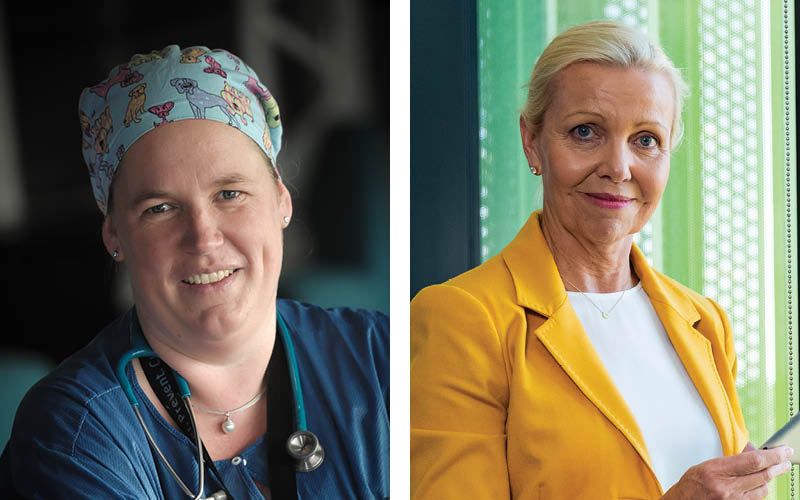
Professor Britta Regli-von Ungern-Sternberg and Professor Donna Cross
Congratulations to two of The Kids Research Institute Australia’s most respected female researchers – Professor Donna Cross and Professor Britta Regli-von Ungern-Sternberg – on being inducted into the Western Australian Women’s Hall of Fame.
Established in 2011 and taking place annually on 8 March to mark International Women’s Day, the Women's Hall of Fame recognises and celebrates the achievements of women across sectors including Health, STEM, Community, Business, the Arts, Culture and Sport.
Professor Donna Cross – Head of the Health Promotion and Education research program at The Kids and the Western Australian Node Director for the ARC Centre of Excellence for Children and Families Over the Life Course – was recognised for her achievements over a career spanning more than three decades.
A strong advocate for the safety, health and socio-emotional wellbeing of children, young people and their families, Professor Cross has campaigned for investment in actions that strengthen health, development and learning.
Her research and advocacy have tackled issues including drug use, cigarette smoking, bullying, child abuse, mental health, road injuries and, more recently, cybersafety. She has worked tirelessly to ensure her findings are translated into evidence-informed policy and practice that improve the lives of young people and their families.
Professor Cross said she was honoured to be inducted into the WA Women’s Hall of Fame and to be seen as role model for other women in STEM.
“There is still much gender inequity in STEM – more needs to be done to proactively encourage women to study and build a career in science-related fields,” Professor Cross said.
“We need to make systematic and cultural changes across the sector to attract, empower and retain women in the STEM careers – including providing high quality and accessible child care.
We also need to increase the visibility of women in the field, particularly culturally diverse women, as STEM role models to enable the full participation of women and girls.
Professor Britta Regli-von Ungern-Sternberg – who is a Consultant Paediatric Anaesthetist at Perth Children’s Hospital, the Chair of Paediatric Anaesthesia at The University of Western Australia, and Team Leader of Perioperative Medicine at The Kids Research Institute Australia – was recognised for her global contributions to paediatric anaesthesia research.
The first and, so far, only Chair of Paediatric Anaesthesia in Australasia, she leads a multi-disciplinary team and has created a hub for paediatric anaesthesia research in WA.
Professor Ungern-Sternberg has gained global recognition as a research leader whose research and advocacy have helped to make anaesthesia safer for children. Her work has led to significant global practice changes and, consequently, a reduction in complications.
“Paediatric anaesthesia is a high-risk specialty involving vulnerable patients with the potential for significant long-lasting harm,” Professor Ungern-Sternberg said.
“My goal is to ensure that when a child needs a vital operation, it is as safe and pain-free as possible.”
Professor Ungern-Sternberg said it was flattering to have her research achievements recognised and to join other amazing women in the WA Women’s Hall of Fame. She hoped other women in the STEM field were inspired by this recognition and encouraged to keep innovating, creating, researching and achieving great things.
“I am keen to share my research and enthusiasm for science with young people and be a source of inspiration,” she added.
“As well as my role as a clinician-scientist in paediatric anaesthesia, I am regularly involved in STEM engagement activities at Perth schools. As a mother and primary carer of three young children, including two daughters), I am keenly aware of the importance of positive female role models and of the mantra that ‘if you see it, you can be it’.
“Hopefully more recognition like this for female researchers will be one of the stepping stones towards attempting to bridge the large gender inequality in medicine and STEM. I plan to keep pushing for meaningful changes in policy and against traditional gender-stereotyping culture.”
The Kids Research Institute Australia Director Professor Jonathan Carapetis congratulated both women, saying each was a shining light in health research and advocacy and a powerful example of women achieving highly in STEM fields.
“Both Donna and Britta have contributed to the health and wellbeing of kids in Western Australia and beyond in incalculable ways,” Professor Carapetis said.
This International Women’s Day, we pay tribute not just to their contributions, but to those of all women in health and medical research.
“We are proud to have hundreds of talented female researchers and STEM leaders working with The Kids Research Institute Australia and making a tangible difference to the lives of children and young people.
“We know, however, that more must be done to ensure girls and young women from all backgrounds not only enter STEM-related fields, but are supported to progress and achieve to their full capacity – becoming the leaders and changemakers of today and tomorrow.”
